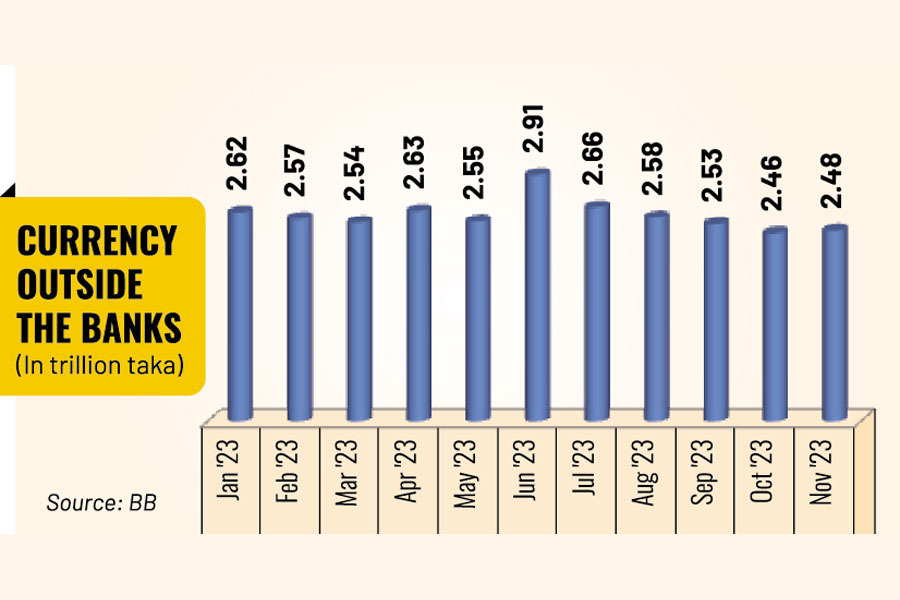Currency outflow from banks again
Mattress money accumulation impacts liquidity situation

Published :
Updated :

After recent reduction, the volume of mattress money or currency outside banks shows an upturn again to the worry of liquidity-hungry banks that have to borrow costly funds.
Sources at Bangladesh Bank (BB) have said the amount of deposit outflow from the banking system kept declining gradually since June 2023 through the first four months of the current fiscal year (FY'24) in a much-needed respite to the commercial lenders at a time when liquidity situation continues tightening.
But, since the month of November, it has been showing a reverse course with the volume of currency outside bank vaults increased by around Tk 25 billion to Tk 2.48 trillion from October's count of Tk 2.45 trillion, according to the latest BB data.
Officials and money-market analysts cite factors like election economy, inflationary burden and the start of festive season, wedding in particular, behind the surge in mattress money.
The sources said the deposit outflow from banks kept rising since September 2022 following reports of gross irregularities in some commercial banks. The amount rose to a record-high Tk 2.92 trillion in June 2023.
The BB-mandated new rate regime on the market-based reference rate, known as SMART (six-month moving average rate of treasure), has played a part in bank-deposit buoyancy.
Such continuous rise in deposit gains amid a contractionary monetary policy started luring potential depositors to banks, especially at a time when other windows for investment continue to shrink ahead of the general election.
As a result, the volume of deposit outflow from banks keeps declining with figures reaching Tk 2.66 trillion in July, Tk 2.58 trillion in August and Tk 2.53 trillion in September, showed the BB data.
Seeking anonymity, a BB official has said currency outside the banks normally goes up a bit in the second quarter of a fiscal year. But there are some other factors, like election and inflationary pressure, which might cause the rise.
Syed Mahbubur Rahman, managing director and CEO of Mutual Trust Bank (MTB) PLC, says because of higher returns, institutional and individual investors in banks have already started diverting their funds into government treasuries-treasury bills and bonds.
Citing data, he says the share of the non-competitive bids, where individual and institutional investors normally take part, against the notified auction demand was only 10 per cent in June 2023 from when the rates kept climbing fast. Now the share crossed 20 per cent.
"This could be a major reason behind the rise in currency outside the banks," the experienced banker says.
Managing director and CEO of Dhaka Bank PLC Emranul Huq thinks carrying out election-related activities requires cash supports and many of the election aspirants could withdrew deposits from the banks to finance their campaigns, including buying nomination forms, printing posters and leaflets and funding electoral sub-offices.
Contacted over the conundrum, Policy Exchange of Bangladesh chairman Dr M Masrur Reaz said 'election economy' is completely cash-based and it could cause the deposit outflow from the banks ahead of the parliamentary elections.
Higher-inflation regime is another factor although the rate of inflation officially dropped to 9.49 per cent in November. "But the price of commodities in the market does not indicate any fall. So, people might withdraw deposits for their living."
And the third, but very important, factor is that winter season is basically known as the festive season which starts from November. People normally plan for wedding and tourism in that season, the economist says.
jubairfe1980gmail.com


 For all latest news, follow The Financial Express Google News channel.
For all latest news, follow The Financial Express Google News channel.